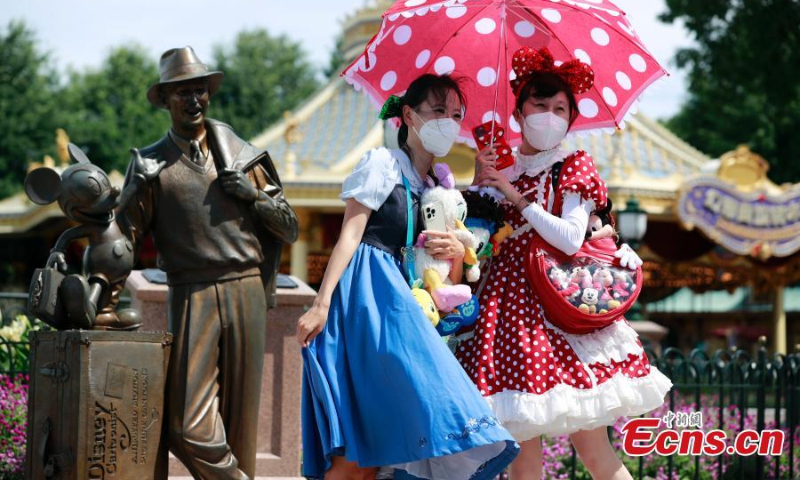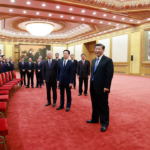A nationwide festive mood for the weeklong National Day holidays is giving a shot in the arm of China’s tourism and leisure industry, early data suggested, pointing to a recovery underway in the world’s second-largest economy.
Attractions, theme parks, shopping malls and movie theaters across the country were packed with tourists, showing a recovery in consumer demand as the economy recovers from the effects of a prolonged epidemic outbreak and rising global uncertainty.
In a fresh sign of an economic rebound, the Caixin BBD new economy index was revealed Sunday to have tallied 30.3 in September, meaning that new economy industries made up 30.3 percent of the country’s total economic inputs. The reading was 0.4 percentage points higher than the previous month.
Photos and video clips depicting attractions brimmed with tourists were among the trendiest topics on Chinese social media including Sina Weibo, Douyin and Xiaohongshu on Saturday and Sunday, the first two days of the weeklong festival.
For instance, massive queues of travelers were spotted in the nearby area of the famed West Lake in Hangzhou, East China’s Zhejiang Province.
All of the city’s scenic attractions hosted 1.78 million travelers on Saturday, recovering to 91.41 percent of the prior-year level, Hangzhou Daily reported on Sunday, citing local culture and tourism authorities.
Another example was the Shanghai Disneyland theme park which will likely embrace the biggest visitor flows for this year during the National Day holidays, local newspaper Xinmin Evening News reported on Sunday.
Many popular attractions, including the Zhangjiajie Grand Canyon in Central China’s Hunan Province and Wuyi Mountain in East China’s Fujian Province, are credited with inspiring travel enthusiasm, announcing free admission to tourists from across the country.
The waiving policy will be effective until the end of the year. This year’s pro-tourism policies are unprecedented, according to China Newsweek, citing executives at multiple attractions.
Such free admissions were not new. Around the Qingming Festival in 2020, the Huangshan Mountain in East China’s Anhui Province announced to offer free admission for residents hailing from the province for 15 days, resulting in an outburst of tourist inflows and an urgent suspension of tourism reception not long after.
It is worth noting that local tours and families exploring the suburbs play a major role in holiday travel in big cities this year, especially in metropolitan areas where locals are encouraged to stay during the holidays to minimize Omicron’s threat.
Inns and hostels in suburban Beijing were hotly pursued, with many of them going for as much as several thousand yuan per night.
In the case of Shanghai, the local tourism vehicle rental market is getting a tailwind from the festival. The number of car rental bookings soared 248 percent in the recent week over the previous week, Chinese state broadcaster reported on Sunday.
The weeklong festival also turns out to be an accelerator for the retail sector. Major shopping complexes in Suzhou, East China’s Jiangsu Province, have unveiled varied promotions for the National Day holidays, as part of a citywide pro-consumption campaign running until November, the Suzhou Daily reported on Saturday. Digital red packets containing a total of more than 80 million yuan ($11.24 million) will be distributed throughout the campaign to further unleash the consumption potential, the report said.
Cinemas were arguably among most-favored places to go as well.
As of 2 pm Sunday, the country’s box office over the National Day holidays had topped 500 million yuan, according to data from Chinese ticketing app Maoyan.
The reading couldn’t compare with its year-ago level of more than 1.26 billion yuan, but was well above its level a month ago – 62 million yuan on September 1-2, Maoyan statistics showed.
Passenger trips via railroad, highway, waterway and air totaled 33.96 million on Friday, one day prior to the festival, a jump of 35.3 percent from the month before, according to official data. The reading slid 32.9 percent from the same period of 2021 and 37.1 percent from its 2020 level.
On Saturday, railway passenger trips hit 9.7 million nationwide, the state railway operator revealed, forecasting the number to moderate to 6.4 million on Sunday.
The Yangtze River Delta region, one of the country’s most populated and economically vibrant regions, posted 2.54 million train trips on Saturday, the highest single day number this year. The reading was estimated to reach 1.86 million on Sunday.
(Global Times)




